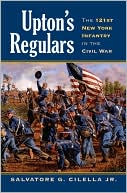| If this website has been useful to you, please consider
making a Donation.
Your support will help keep this website free for everyone, and will allow us to do
more research. Thank you for your support! |
121st New
York Infantry
Online Books:
121st New York
Infantry Soldier
Roster - Annual Report of the Adjutant General of the State of New York For the Year
1893, Volume 36 View the Entire Book
History of
the 121st New York State Infantry by Isaac Oliver Best, 1921
Websites:
Muster
Rolls of the 121st New York State Volunteer Infantry
| Regimental History |
| One Hundred and Twenty-first New York Infantry. — Cols., Richard Franchot,
Emory Upton, Egbert Olcott; Lieut.-Cols., Charles H. Clark, Egbert Olcott, Henry M.
Galpin, James W. Cronkhite, Johri S. Kidder; Majs., Egbert Olcott, Andrew E. Mather, Henry
M. Galpin, James W. Cronkhite, John S. Kidder. This regiment, recruited in the counties of
Otsego and Herkimer, rendezvoused at Herkimer and was there mustered into the U. S.
service for three years on Aug. 23, 1862, and in May, 1863, the three years men of the
18th, 27th, 31st, 16th and 32nd N. Y. infantry were transferred to it. The regiment left
the state Sept. 2, 1862, and was immediately assigned to the 2nd (Bartlett's) brigade, 1st
(Brooks') division, 6th corps, with which command it continued during its entire term of
service. It joined McClellan's army in Maryland and was present but not active at the
battle of Crampton's gap. The 6th corps was only partially engaged at the battle of
Fredericksburg, though the 121st lost a few killed and wounded by the artillery fire to
which it was exposed. The regiment fought with great gallantry and was exposed to a deadly
musketry fire at Salem Church, Va., where it lost 48 killed, 173 wounded and 55 missing,
out of 453 officially reported as present. All except 23 of those reported missing were
killed, and the loss was the greatest sustained by any regiment in the battle. Col.
Franchot resigned in Sept., 1862, and under his successor Col. Upton, an unusually
efficient officer, the excellent material of the regiment was molded into a finely
disciplined organization. Col. Upton was promoted to Bvt. brigadier-general in Oct., 1864,
and achieved an enviable reputation in the war. The regiment was in reserve at Gettysburg
and was not again engaged with loss until the 6th corps returned to Virginia, when it lost
25 killed and wounded at the battle of Rappahannock Station in Nov., 1863. It was not
heavily engaged during the Mine Run campaign, at the close of which it went into winter
quarters at Brandy Station. In May, 1864, the regiment moved on the bloody campaign of
Gen. Grant, crossing the Rapidan on the 5th, and plunging into the sanguinary struggle of
the Wilderness, where it lost 73 in killed, wounded and missing. In the battle of
Spottsylvania Col. Upton commanded and led in person an assaulting column of twelve picked
regiments belonging to the 6th corps, the 121st being placed in the advance, an honor
which cost it dear. The losses of the regiment at Spottsylvania amounted to 49 killed, 106
wounded. In the magnificent charge of Upton's storming party, the strong works of the
enemy were carried after a hand-to-hand struggle. Said Gen. Upton in a private letter;
"Bayonet wounds and sabre cuts are very rare. But at Spottsylvania there were plenty
of bayonet wounds, and no picture could give too exalted an idea of the gallantry of the
121st N. Y., 5th Me., and 96th Pa., as they led the assaulting column of twelve picked
regiments over the formidable intrenchments which confronted them." The regiment was
successively engaged at North Anna, Totopotomy, Cold Harbor, the first assaults on
Petersburg, and the Weldon railroad. When Early menaced Washington in July, the veterans
of the 6th corps were ordered there to confront him, and the 121st was engaged at Fort
Stevens with a loss of 26 in killed, wounded and missing. It followed with the corps in
pursuit of Early through Maryland, into Virginia, and up the Shenandoah Valley, fighting
at Charlestown, the Opequan, Fisher's hill, and Cedar creek, its loss in the last named
battle amounting to 10 killed, 42 wounded and 5 missing. The 1st division was commanded by
Gen. Wright at the Wilderness; by Gen. Russell at the Opequan; and by Gen. Wheaton at
Cedar creek. In Dec, 1864, the regiment returned to the Petersburg trenches and
established winter quarters near the Weldon railroad. It took a prominent part in the
final assault on the fortifications of Petersburg, April 2, 1865, and in the hot pursuit
of Lee's army, during which it lost 34 killed and wounded, and fought its last battle at
Sailor's creek. The regiment captured 4 flags at Rappahannock Station and 2 at Sailor's
creek. It was mustered out at Hall's hill, Va., under Col. Olcott, June 25, 1865. It took
part in 25 great battles, and gloriously earned its title as an efficient and dashing
fighting regiment. Its total enrollment during service was 1,897, of whom 14 officers and
212 enlisted men were killed and mortally wounded; 4 officers and 117 enlisted men, died
of disease and other causes. Its total of 226 killed is 11.9 per cent of its membership,
and its total of 839 killed and wounded was one of the largest sustained by any regiment. |
Footnotes:
Regimental history taken from "The Union Army" by Federal Publishing
Company, 1908 - Volume 2
|
Whats New
Bibliography
About Us

Upton's Regulars: The 121st New York Infantry in the Civil War by Salvatore G. Cilella |
